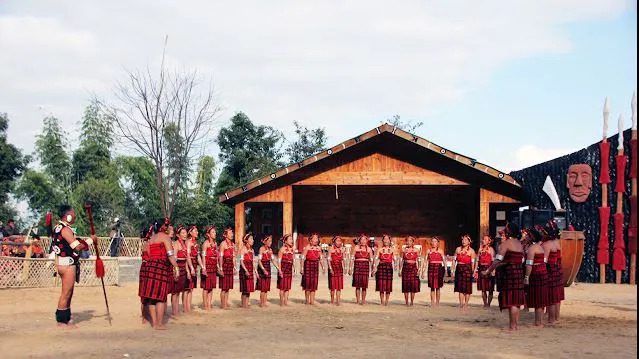
Nagaland, India: The Women Cell/Anti Sexual Harassment Cell, Japfü Christian College, Kohima, in collaboration with IQAC, JCC, and with assistance from the Nagaland State Commission for Women (NSCW), presented a national conference with the theme “Naga women traditional attires: celebrating us” on May 6, 2023.
The seminar’s guest speakers were announced in a press release, including Dr Easterine Kire, an author; Dr Theyiesinuo Keditsu, an assistant professor at Kohima College; and Prof. Ajailu Niumai from the University of Hawaii.
Every Naga textile was “conceived and created by a woman’s hand and a woman’s mind, not by the hands of a man,” according to Dr Kire’s preface. She believed that a body cloth should be used to cover the body and that women should wear a waist cloth underneath. It needs to be more unique if you refer to it as a shawl.
According to Kire, the closest way to comprehending what it could be like to wear a poem is to model our traditional clothes.
She underlined the importance of documenting the many designs on our clothing and obtaining crucial information about the weaving technique before it is too late to ensure that “the celebration goes on for years and years.”
Prof. Ajailiu Niumai, a well-known sociologist, talked about “attires as a symbol of cultural identity.” “Naga attires are distinctive to our cultural identity,” she said. We should enjoy it rather than be ashamed because it signifies our Naga cultural heritage.
According to her, how we present ourselves and how we dress is a reflection of our past. It serves as a social cue, a social signal, and a review of our unique identities, which enables us to experience a sense of connection to our cultural roots.
She also underlined the importance of weaving as a craft to preserve the rich cultural heritage and unique identity of the Naga people.
Khala is among the most democratic and inclusive dress options available to Naga women, according to Dr Thieyiesinuo Keditsu. According to Dr Keditsu, fashion is a language, and clothing may communicate long after a speaker dies.
She explained that weaving is a form of caring and business and that to “celebrate us” calls for more than just dressing in our clothes. It also calls for us to think critically, reevaluate our views on women’s jobs, and even take up weaving.
